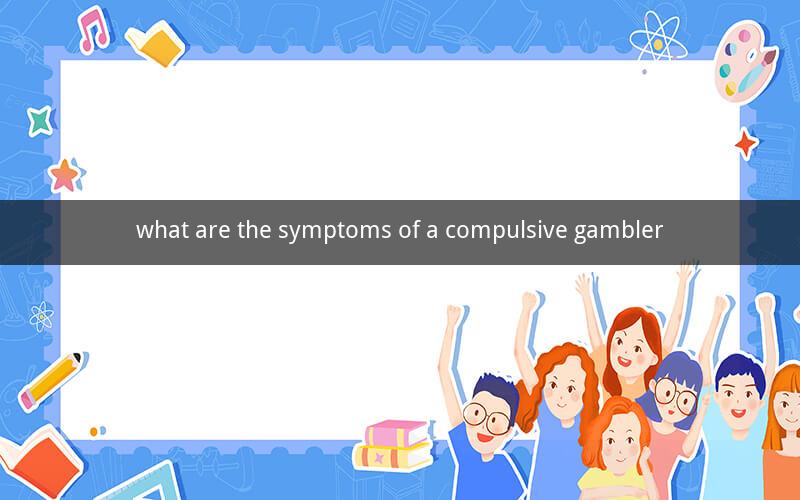
Table of Contents
1. Introduction to Compulsive Gambling
2. Understanding the Nature of Compulsive Gambling
3. Symptoms of a Compulsive Gambler
3.1 Financial Consequences
3.2 Emotional and Psychological Symptoms
3.3 Social and Relational Symptoms
3.4 Physical Symptoms
4. Diagnosis and Treatment
5. Conclusion
1. Introduction to Compulsive Gambling
Compulsive gambling, also known as gambling addiction, is a type of addiction that affects individuals who have an uncontrollable urge to gamble despite the negative consequences it may bring into their lives. It is a complex disorder that involves psychological, social, and sometimes physical aspects. In this article, we will explore the symptoms of a compulsive gambler, providing a comprehensive understanding of the signs that may indicate someone is struggling with this addiction.
2. Understanding the Nature of Compulsive Gambling
Compulsive gambling is characterized by a pattern of persistent and uncontrollable gambling behavior that disrupts the individual's personal, social, and professional life. It is a chronic condition that can lead to severe consequences if left untreated. The nature of compulsive gambling can be influenced by various factors, including genetic predisposition, environmental factors, and psychological vulnerabilities.
3. Symptoms of a Compulsive Gambler
3.1 Financial Consequences
One of the most evident symptoms of a compulsive gambler is the financial consequences that arise from their gambling behavior. These consequences may include:
- Unpaid bills or debts
- Financial strain on relationships
- Borrowing money from friends or family
- Selling personal belongings to fund gambling activities
- Using credit cards or taking out loans to finance gambling
3.2 Emotional and Psychological Symptoms
Compulsive gamblers often experience emotional and psychological symptoms, which may include:
- Feelings of guilt, shame, or remorse after gambling
- Increased anxiety or stress levels
- Depression or mood swings
- Difficulty concentrating or making decisions
- Obsession with gambling, even when faced with negative consequences
3.3 Social and Relational Symptoms
The social and relational aspects of a compulsive gambler's life can also be severely affected. These symptoms may include:
- Isolation from friends and family
- Loss of employment or decreased work performance
- Dishonesty or secrecy regarding gambling activities
- Disruption of personal relationships
- Legal problems, such as theft or fraud, to fund gambling
3.4 Physical Symptoms
While physical symptoms are less common, some compulsive gamblers may experience the following:
- Insomnia or sleep disturbances
- Loss of appetite or weight fluctuations
- Nausea or stomachaches
- Tension or muscle aches
- Headaches or migraines
4. Diagnosis and Treatment
Diagnosing compulsive gambling involves assessing the individual's gambling behavior and its impact on their life. A mental health professional, such as a psychologist or psychiatrist, can provide a proper diagnosis. Treatment for compulsive gambling may include:
- Cognitive-behavioral therapy (CBT)
- Support groups, such as Gamblers Anonymous
- Medication, in some cases, to manage underlying mental health conditions
- Financial counseling to address financial consequences
5. Conclusion
Compulsive gambling is a complex disorder that can have severe consequences for individuals and their loved ones. Recognizing the symptoms of a compulsive gambler is crucial in seeking help and support. By understanding the nature of this addiction and the available treatment options, individuals can take the first step towards recovery.
Questions and Answers:
1. What are the financial consequences of compulsive gambling?
Compulsive gambling can lead to unpaid bills, debts, borrowing money, selling personal belongings, and using credit cards or loans to fund gambling activities.
2. Can compulsive gambling cause emotional and psychological symptoms?
Yes, compulsive gambling can cause feelings of guilt, shame, remorse, anxiety, stress, depression, mood swings, difficulty concentrating, and obsession with gambling.
3. How does compulsive gambling affect social and relational aspects of a person's life?
Compulsive gambling can lead to isolation, loss of employment, dishonesty, disruption of personal relationships, and legal problems.
4. Are there any physical symptoms associated with compulsive gambling?
Physical symptoms of compulsive gambling are less common but may include insomnia, loss of appetite, nausea, tension, muscle aches, headaches, or migraines.
5. How can a compulsive gambler seek help for their addiction?
A compulsive gambler can seek help by consulting a mental health professional, joining support groups like Gamblers Anonymous, or seeking financial counseling.
6. Can medication be used to treat compulsive gambling?
Medication may be used in some cases to manage underlying mental health conditions associated with compulsive gambling.
7. What is cognitive-behavioral therapy (CBT)?
Cognitive-behavioral therapy (CBT) is a type of therapy that helps individuals identify and change negative thought patterns and behaviors associated with their addiction.
8. How can a person recognize if they have a gambling problem?
A person can recognize if they have a gambling problem by assessing their gambling behavior, its impact on their life, and the presence of symptoms such as financial strain, emotional distress, and social consequences.
9. Are there any support groups available for compulsive gamblers?
Yes, there are support groups available for compulsive gamblers, such as Gamblers Anonymous, which provide a supportive environment for individuals to share their experiences and receive guidance.
10. How can family and friends help a compulsive gambler?
Family and friends can help a compulsive gambler by offering support, encouraging them to seek help, being patient, and understanding the challenges they face. They can also educate themselves about compulsive gambling to better understand and support their loved one.